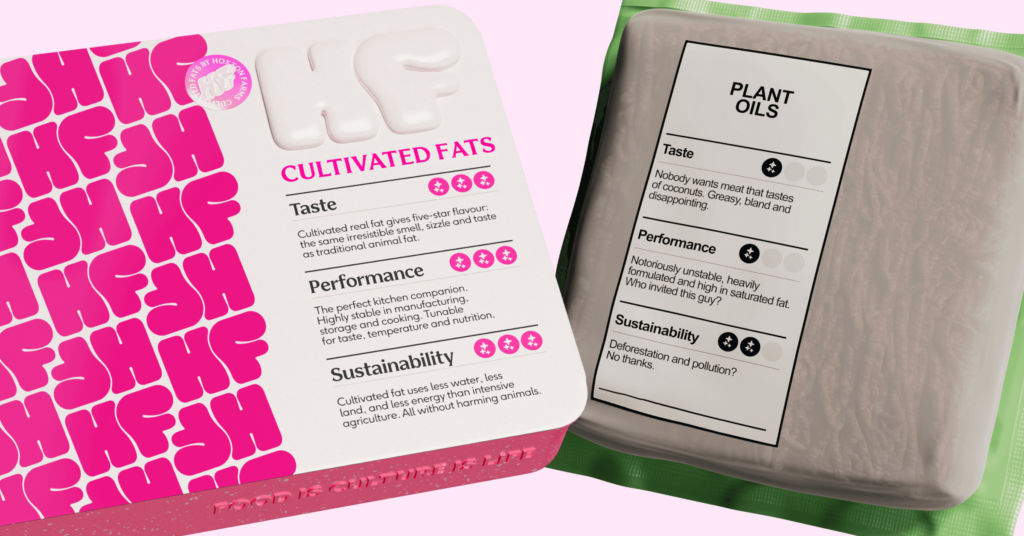5 Mins Read
British cultivated meat player Hoxton Farms has partnered with Japan’s Sumitomo Corporation to bring its pork fat ingredient to Asia.
For cultivated meat, fat is all the rage right now.
In Europe, Mosa Meat has filed for regulatory approval to sell its cultivated beef fat in Switzerland and the EU. Across the Atlantic, Mission Barns has received the go-ahead from the Food and Drug Administration (FDA) to take its cultured pork fat one step closer to commercialisation in the US.
Now, a British cultivated fat startup has set its sights on Asia, the world’s largest consumer of pork. Hoxton Farms has partnered with Japanese conglomerate Sumitomo Corporation to bring its pork fat to the country and the wider Asia-Pacific region.
The two companies will work to secure partnerships with food manufacturers to integrate Hoxton Fat into their products, support awareness initiatives to highlight the potential of the ingredient, and work with regulators and stakeholders to obtain approval ahead of its market entry.
“The partnership spans multiple countries, including Japan, Singapore, Korea and beyond,” Hoxton Farms co-founder and CEO Max Jamilly tells Green Queen.
The company’s plans are firmly global, with regulatory filings ongoing for multiple markings. “We will file this year in Singapore and the US, followed by UK and other jurisdictions such as Thailand, Japan, Korea, and Australia and New Zealand,” he says. “We expect to go to market in Singapore first.”
Hoxton Farms takes on conventional animal and plant fats

Founded in 2020 by Jamilly and COO Ed Steele, Hoxton Farms derives its ingredients from a few pig stem cells, which are fed on a blend of plant-based nutrients to multiply and mature into fat. It makes use of cell biology and machine learning to grow pork fat in modular bioreactors and currently operates a 14,000 sq ft facility in London, which has a fermentation capacity of over 1,000 litres.
This is intended as a drop-in replacement for animal fats and plant-based oils, which can be mixed with plant proteins to create products like soups, sauces, and hybrid meats, which are seen as the most viable way for cultivated meat to get to market in the current climate.
There are various motivations driving this innovation. It’s much more sustainable than the alternative – pork is a highly emissive food product, and farming pigs requires excessive amounts of water and land. And common plant-based fats like coconut or palm oil, which are preferred by many manufacturers for their functionality, are the primary contributors to tropical deforestation.
Fat is also key to flavour and mouthfeel, which is the most important aspect of meat for many omnivores. By recreating pork fat in bioreactors, Hoxton Farms can offer meat-eaters the same flavour, minus the environmental and health harms.
Speaking of which, processed meats like bacon and sausages are classed as carcinogenic by the WHO, while red meats such as pork are deemed possible carcinogens. Pork fat, coconut or palm oil, meanwhile, are high in saturated fat, which can raise bad cholesterol levels and the risk of heart disease.
Since Hoxton Farms can precisely control the composition of its fat, its team is developing versions that are lower in saturated fat and higher in beneficial elements like omega-3 fatty acids. It’s doing this specifically to reduce the risk of diet-related diseases, which can help address public health concerns in Asia.
More than 40% of adults are overweight or obese in Asia-Pacific, and up to 12% of total healthcare spending goes towards treating obesity or related conditions.
“Cell-based foods are an innovative source of protein that can help address future food security challenges without the need for animal sacrifice and with a lower environmental impact,” says Takeo Kojima, agri-innovation head at Sumitomo. “We see Hoxton Farms’s cultured fat as a groundbreaking ingredient that contributes not only to better taste, but also to sustainability.”
Targeting Japan’s curiosity for cultivated meat

Asia’s demand for meat is set to increase by 78% by 2050, putting further strain on the planet’s resources and public health. “Asia is the world’s largest consumer of pork, but supplies are threatened by an array of challenges, including disease (African swine fever massively disrupted the global pork market in 2018),” Jamilly points out. “Further, countries in Asia have a strong regulatory environment for cultivated products.”
The startup, which has raised $35M to date, will co-develop products with food manufacturers via its collaboration with Sumitomo. “With Sumitomo’s unmatched expertise and network, now is the time to bring our cultivated fat to Asia and set a new standard for food innovation,” he says.
The two firms will closely work with food safety bodies in various countries to obtain regulatory approval for the novel ingredient. This includes Japan, whose government is “making steady progress in developing a novel food regulatory framework”, according to Kimiko Hong-Mitsui, managing director of alternative protein think tank the Good Food Institute Japan.
Hoxton Farms and Sumitomo are consulting with the Japan Association for Cellular Agriculture (JACA), an industry non-profit, which they claim will play a crucial role in shaping regulatory and social acceptance of cultivated meat in the country.
The collaboration gives Japanese stakeholders “efficient access to groundbreaking technologies, production facilities, and essential information regarding safety and taste in addressing challenges in food supply”, notes JACA president Megumi Avigail Yoshitomi.
A 2024 survey found that 42% of Japanese consumers are willing to try cultivated meat products; the creation of government regulations is key for 44% of those who are unsure about their safety aspects.
“We hope that this partnership will serve as a key pillar in strengthening bilateral cooperation between Japan and the UK in the field of food technology,” adds Yoshitomi.
Currently, only a handful of cultivated meat firms have been approved to sell their products. This includes Eat Just (in Singapore and the US), Upside Foods, Mission Barns (both US), Aleph Farms (Israel), Vow (Singapore and Hong Kong), and Meatly (UK). Regulators in the EU, Switzerland, Australia and Thailand are evaluating applications too.



